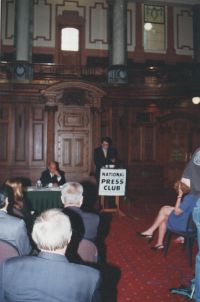Mainstream journalists can break their state of United Nations-induced trance and the first step is to investigate a massive donation that the New Zealand government appears scheduled to transfer to the UN.
National Press Club president Peter Isaac urged print journalists especially to start asking questions about the pending donation to United Nations, find out how much was going to be transferred, why, and when?
Stepping out of the United Nations thrall will allow the mainstream to return to the era in which it covered a diversity of opinions and attitudes.
As it was the subscription readership had been subject to a United Nations mono cultural diet of climate along with subsidiary and now demonstrably-flawed doctrines such as the globalisation one.
Shamelessly, United Nations having sown this distraction sought to link it with the Coronavirus pandemic which its entire apparatus had failed to detect in the first place.
The investigation into the Labour-led coalition’s past and pending contributions to United Nations would be the start of breaking the UN’s monopoly and obvious hold on the journalistic mind set here all too often seen by subscribers as a posturing one.
In practical terms it should also have the effect of keeping in New Zealand money needed for the welfare of its own citizens.
Isaac said that United Nations had been founded with the finest of motives.
Journalists in New Zealand especially had failed to recognise what Isaac described as the “policeman-becoming-preacher” in the UN transformation from its original peace keeping role into a self-serving propaganda one.
Isaac was talking in the context of the New Zealand newspaper chains themselves seeking donations or government financing in lieu of paid subscribers.
Some tough questions asked about the New Zealand role in financing the UN and would be a better option he said.
This was because it will signal to subscribers and potential subscribers a return to the era in which local imperatives elbowed aside showy international ideologies.
















